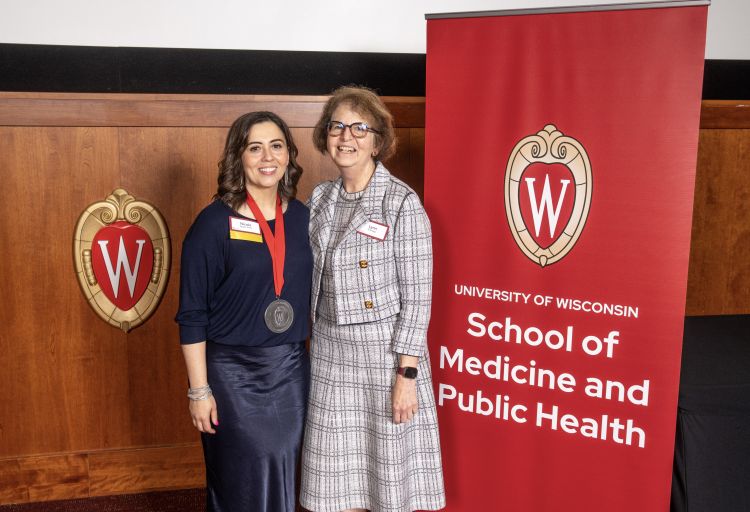Dr. Nicole Rogus-Pulia’s new faculty fellowship advances research on dysphagia
Philanthropy at work in the Department of Medicine

Nicole Rogus-Pulia, PhD, associate professor, Geriatrics and Gerontology, will be able to expand her research on swallowing problems (also known as dysphagia) in vulnerable older adults—including people with Alzheimer’s disease, head and neck cancers, stroke, and Parkinson’s disease—thanks to support from the new Linda and Howard Stern Faculty Fellowship in Dysphagia.
Dr. Rogus-Pulia was formally honored with the endowment at the University of Wisconsin School of Medicine and Public Health’s Faculty Investiture Celebration on June 18, 2025.
Her team’s work will ultimately improve the health and quality of life for older people with dysphagia—and the families who care for them.
People with dysphagia will have improved swallowing function, resulting in better overall health and quality of life.
Nicole Rogus-Pulia, PhD
Earlier, better swallowing interventions
Shared meals are one of the most cherished rituals of family life.
But for the 45% to 80% of patients with Alzheimer’s disease who also have dysphagia, it’s hard to enjoy these special occasions. Dysphagia also creates additional tasks, concerns and stress for their care partners.
What’s more, dysphagia can lead to serious health consequences, including pneumonia, malnutrition, dehydration, and even feeding tube placement.
Unfortunately, swallowing problems aren’t always easy to spot. Some patients experience “silent aspiration,” which means that material is breathed into the lungs, but without an audible cough or throat clear.
In addition, because of the cognitive changes associated with Alzheimer’s disease, some patients may not fully recognize that they’re having swallowing problems.
In the video below [YouTube], Dr. Rogus-Pulia explains how her research team advances earlier, better interventions to recognize and improve patients’ swallowing function.
“I am so grateful and honored to receive this fellowship,” Dr. Rogus-Pulia reflects. “This support will allow me to conduct more ambitious, expansive dysphagia research and also focus on supporting the next generation of researchers.”
“As a result, people with dysphagia have improved swallowing function, resulting in better overall health and quality of life,” she continues.
“That will translate over to other aspects that impact quality of life, like being able to partake in meal times and go out to eat with the people that they love.”
The Linda and Howard Stern Faculty Fellowship in Dysphagia was supported by the Linda and Howard Stern Family and numerous additional contributors.